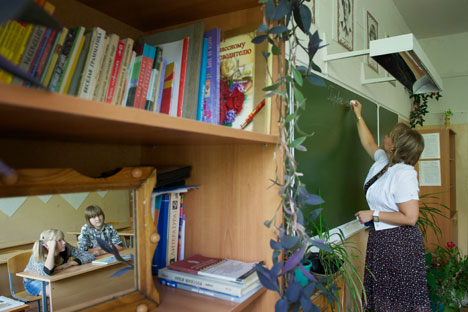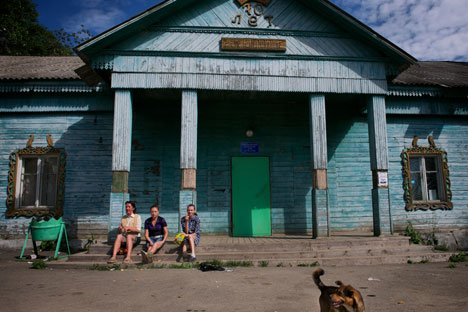How Russian teachers make ends meet

Teaching in Russian regions and villages requires a lot of professional dedication becuase the job of schoolteacher is not well-paid. Alla Mosevnina (pictured), one of Russia’s best schoolteachers lives in Opolye village, in the Vladimir region. Sour
One of Russia’s best schoolteachers lives in Opolye village, in the Vladimir region. Alla Mosevnina participates in so many professional contests that she always has a chance to win at least one of them each year. This time Mosevnina, a teacher from a common village school, has reached the top again: she received the award ‘2012 Best Teacher in Vladimir Region’. Ogoniok visited Alla Mosevnina to get acquainted with the schoolteacher and, eventually, discover that all Opolye teachers are cut from similar cloth.
“Meat Used To Be More Expensive”
The physics teacher, Grigoriev, is cutting the grass with a school electrician in front of the school building. The school head, Zinaida Koshkina, shrugs her shoulders, “Who will do it, if they will not? They are the only men on our staff.” Zinaida Ivanovna herself controls the women’s duties: the female teachers are cleaning windows, carrying textbooks and arranging school desks. “Everybody, even our relatives are involved in preparations for the Day of Knowledge: Physics teacher’s mother is watering the plants and the husband of the deputy head is painting floors,” Koshkina says.
One of Grigoriev’s colleagues, Maxim Nikolayevich, also works as a contract builder in the summer. His 12,000-ruble teacher's salary (about $370) is not much for a family with two children. He used to joke that a teacher’s reply to the question, “What are the three reasons why you love your profession?” should be "June, July and August." Now he has to be serious.
We are surprised and ask “Were teachers’ salaries higher before?” Experienced teachers reply, “Meat used to be more expensive.” Teachers used to keep farm animals and had enough money, as they say, to buy Zhiguli cars with the money earned from selling meat. And now village teachers have no additional income, aside from the summer season work gathering and selling berries and mushrooms. Tutoring is not considered: they neighborly hold additional classes for underachievers for free. Consequently, they can only reminisce about past years’ “riches”.

The school in Opolye village, located in the Vladimir Region. Source: Kommersant
Pleasant surprises, however, do sometimes happen. Four years ago, Alla Alexandrovna was awarded 100,000 rubles (nearly $3,100) as the region's best teacher. This year she has reached the top as well: the Department of Education of Vladimir Region awarded Mosevnina one of the awards for 2012 Best Teacher in Vladimir Region.For her “positive social contribution and high-quality education methods,” Mosevnina was awarded 200,000 rubles ($6,200) with this honor. Frankly, this is a great deal of money for a village teacher: Grigoriev, the physics teach, has to work for almost two years to earn this amount.
‘Soft Job’
In Soviet times, a large agricultural complex was situated in Opolye. Now, only a small cowshed, a wooden recreation center and a 90-student school serve as reminders of complex’s former greatness. Still, the local women say that village children have everything necessary provided to them in Opolye. Nadezhda Zakharova says rather proudly, “Our kindergarten is beautiful, there are swans painted on the walls. And the school is really great. It is made of stone. The teachers are pleasant and clean. What a pity, I haven’t become a teacher. It is a good idea. The job is soft and, people say, well-paid.”
News of Alla Mosevnina’s reward has spread around the village. Alla Alexandrovna sighs, “People do not understand how much effort it requires. The teacher’s basic salary is 4,000 rubles ($125). Whether a teacher will get more or not depends on the qualifications, length of employment, number of working hours, as well as professional achievements. So, professional contests also matter.”
School head Koshkina says of her dreams, “If I had been a minister of education, I would have cut the amount of paper work teachers have to do. We report on everything, absolutely everything. Before, only one paper, the curriculum, was required. And now we have to write dozens of such papers. We even report on corruption. What corruption can be in a village school? Instead, we bring things here: colored paper, flowerpots, etc. I cannot speak about teachers in town, but village teachers dedicate themselves to school completely, it does not work here otherwise. I do not understand why so many people think that Alla Alexandrovna was awarded for her beauty. She stays in school until night! And she does not spend the award on her own entertainment.”
Mosevnina spent her previous award of 100,000 rubles ($3,100) on gas pipes for her house, “I still had to add some of my own money,” Mosevnina says. Other teachers took loans for their gas pipes, and they have been paying them off ever since. Alla Alexandrovna does not know yet what she will spend this year’s award on, “I really would like to go to the sea. But my son has entered the pedagogical institute…”
“I Am Not Alone to Stay Here Till Night”
Of course, there are people in Opolye who envy Mosevnina’s award. This is natural: otherwise, it would not be a village. Still, the majority of the village residents usually treat teachers with great respect. The men sitting on the bench even stand up, “Our humble bow to the local teachers. They tell our children about literature, nature, about you know what…”
Alla Alexandrovna, for her part, is sure that even village underachievers are somehow better off than their town counterparts. Mosevnina says of schooldchildren in the village: “They are inherently more kind and human. When I read about different horrors in town schools, for instance, that a teacher was beaten, I am shocked. Nothing of that kind has ever happened in our school. The most our pupils will do is to put a pin on a chair.” Pupils are also not strangers to teachers. “We know everyone in the village, what happens in everyone’s family,” says Mosevnina. But schoolteachers are not known outside of the village and this fact disappoints Alla Alexandrovna.
She says, “I am not the only one that stays here until night. I just find time to participate in professional contests, that’s why I am awarded more often and that’s why you have come here. But nothing is said about our other teachers. Absolutely nothing. But they do work here.” They do work here and they manage to work at full strength. They do not leave to find big money in Moscow; they cope with senseless reports; they gather food in the school’s garden, in order to feed children in the cafeteria; they even paint floors and cut chalk, which is, for some reason, delivered to them in giant pieces. They are here, preparing for one more year of their soft, demanding and beloved destiny.
First published in Russian in the Ogoniok magazine.
All rights reserved by Rossiyskaya Gazeta.
Subscribe
to our newsletter!
Get the week's best stories straight to your inbox